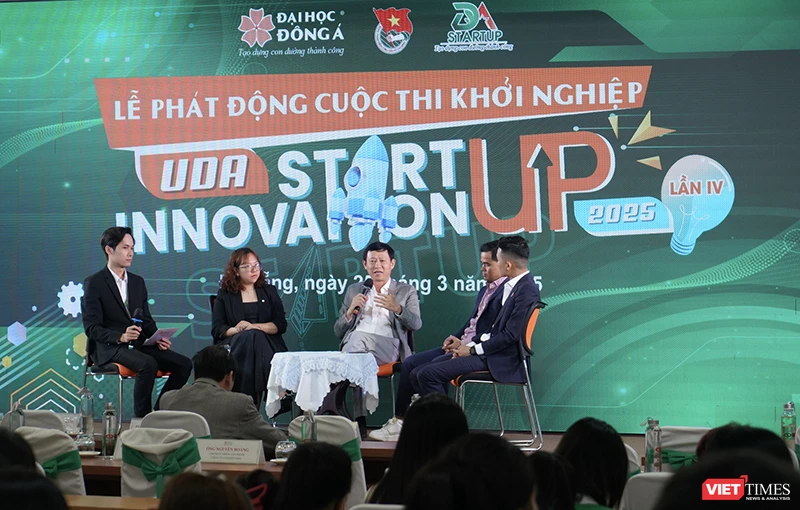In recent years, the field of artificial intelligence (AI) has witnessed a strong wave of startups. Alongside promising opportunities, a major challenge remains: the ability to access high-quality data for training accurate and efficient AI models.
Data as a Barrier
AI is no longer a field reserved solely for major tech corporations. Today, many startups are leveraging AI to tackle specific problems within individual industries.
A notable example is AILIVER, a startup that made a strong impression with its presentation on using AI as a solution to support early liver cancer diagnosis. The presentation took place at the finals of the Aiviet Innovation Awards 2024, organized by the Ái Việt Venture Fund in mid-February.
As one of the seven teams competing, AILIVER was introduced as having high potential by harnessing the power of AI to help doctors detect early abnormalities and provide more accurate assessments. In contrast, traditional diagnostic methods still rely heavily on image quality and physician expertise.
Hiền Nguyễn, co-founder of AILIVER, stated that their model was trained on medical imaging data from Hanoi Medical University. AILIVER is also backed by Novodan, a biomedical technology company based in Northern Europe, and utilizes NVIDIA’s image analysis technologies.
Despite the impressive presentation, judges at the competition raised concerns about data quality—emphasizing that medical data in Vietnam may be inaccurate or lack standardization. AILIVER’s representative responded that the team had collaborated with experienced doctors to review, verify, and label the data. Additionally, they plan to partner with other hospitals in the future to expand their data sources.
In fact, AILIVER is not the only startup targeting liver cancer diagnostics. Another prominent name in Vietnam is VinBrain Joint Stock Company, a pioneering tech startup developing AI-powered healthcare solutions, previously funded by Vingroup. In late 2023, VinBrain was officially acquired by NVIDIA, the world’s largest AI chipmaker.
VinBrain’s products support clinical diagnostic methods with the ability to process various types of medical imaging, including X-rays, CT scans, and MRIs. Their AI models can automatically identify and localize abnormalities and lesions with high accuracy.
Another biomedical startup—founded by a former Google employee—has applied AI to genetic testing to detect potential disease risks. This model later received venture capital funding and introduced the concept of “self-discovery” through genetic testing, especially targeted at children.
A judge at the Aiviet Innovation Awards 2024 noted that funding from venture capital for AI research is not lacking. However, actual applicability, accuracy, and compatibility with the healthcare environment in Vietnam—without causing discomfort to users—are what determine the success or failure of an AI healthcare startup.
Overall, data is the core “fuel” that powers AI startups, yet not everyone possesses complete and accurate datasets. New companies often struggle to collect large-scale data due to fragmentation and limited accessibility. Many high-quality datasets are owned exclusively by large corporations. Additionally, sectors such as healthcare and finance are subject to strict privacy and data protection regulations.
The Future of Startups Relies on Data
One example includes a financial analysis tool integrated with ChatGPT, developed by a former financial analyst from a securities firm. The main goal was to “save time on data collection.”
In its first version, users could query financial data, and the system would return concise summaries along with complete data tables. The second version is expected to add more advanced financial analysis capabilities using domain-specific methods.
Large language models and Gen AI, such as ChatGPT, are becoming increasingly popular. The market has seen the emergence of new players backed by major corporations, such as Grok (from X) and DeepSeek from China. While integrating additional advanced tools is logical, the central issue remains: data.
For instance, the aforementioned tool only includes data from the financial reports of listed companies. If users ask, “Which securities company leads the brokerage market in Vietnam?”, the system may omit firms that are not publicly listed.
Earlier, on the HOSE stock exchange, Trịnh Hoài Giang—CEO of Ho Chi Minh City Securities Corporation (HSC)—shared that HSC is also researching ways to apply AI. In the securities industry, AI can be used for research, data aggregation, customer management, and translation. Globally, AI sees the most use in banking, where it helps automate approval processes. Major banks invest heavily in AI and have saved significant costs as a result.
At the recent scientific forum “AI Applications for Financial and Insurance Organizations” hosted by UEH University, experts emphasized the many directions AI can take. Beyond financial analytics and financial assistants, with large-scale data analysis, AI can also help automate administrative processes, optimize profile evaluations, and better handle customer requests—resulting in more accurate lending decisions.
The strong growth of AI startups stems from many factors, including the widespread availability of cloud computing platforms, advances in AI research, and increasing interest from investors willing to fund the field.
Returning to the startup awards hosted by the Ái Việt Venture fund, AILIVER did not win the grand prize but was honored with the “Pioneer” title and received a seed investment of USD 50,000, opening the door for continued testing and product development.
The Airboots project—an agricultural robot developed by Shoes Agtech—won the grand prize.
“We shouldn’t just focus on R&D; we need to innovate and commercialize quickly. The biggest challenge is turning scientific research into real-world applications and generating revenue,” said Dr. Nguyễn Thành Nam, one of the co-founders of FPT Corporation and Chairman of AiViet Venture, commenting on the challenges of startups—whether in AI or not.
Source: National Agency for Science and Technology Information and Statistics





